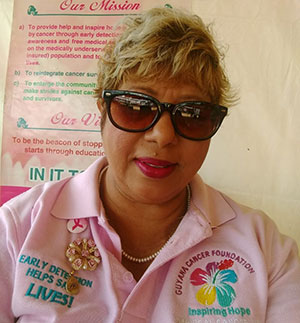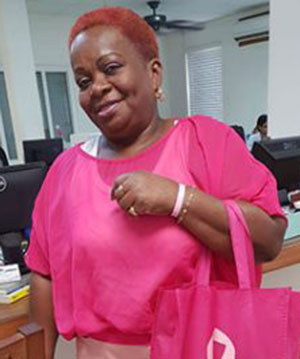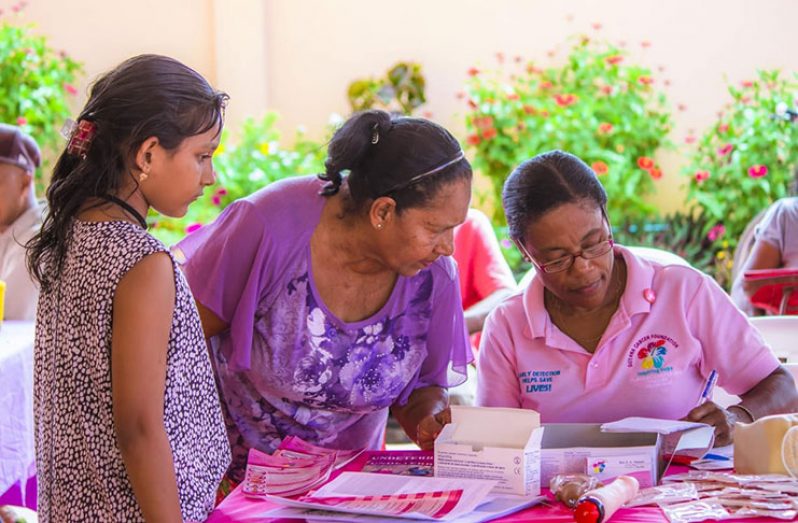HAZEL Chase is a mother of five children and seven grandchildren. When you see her, she always has a smile on her face and is bustling with energy. But Hazel is also a superwoman; her power is that she has survived breast and ovarian cancer.
Chase was diagnosed in 2012. She was in her mid-50s then.

“My doctor was not seeing signs,” she said and explained: “Cancer does not always come in the same way for everybody. I had practically no signs- no skin discolouration, no problem with my nipples, none of that. All I had was a tingling feeling in my right arm.”
Being the jolly, optimistic person that she is, she shared that didn’t worry about that tingling feeling- at least not until she realised that it stayed with her much longer.
“I have a lot of medical people in my family [and] fortunately I discussed it with my sister (who is a medical doctor) and she told me to go to the Guyana Responsible Parenthood Association (GRPA) and get a breast examination done,” Hazel recalled.
Heeding this advice, she went to the GRPA and did the examination. It was here that she felt the “unusual lump” and subsequently did an ultrasound and a mammogram.
She also did a biopsy, which is an examination of tissue removed from a living body to discover the presence, cause, or extent of a disease, where the specimen was taken from her breast and she had to wait three months for the results.
“That day when I went and get the results, I can remember clearly it wasn’t a nice day. I can remember clearly it was a Saturday,” Chase said.

“They don’t say cancer on the results but being around my sisters, I kind of know how to read medical reports and it says all about the different deductions and so,” she explained. It was then she realised that she had cancer- it was Stage One Breast Cancer.
Breast cancer is cancer that develops from breast tissue. Signs of breast cancer may include a lump in the breast, a change in breast shape, dimpling of the skin, or fluid coming from the nipple.
According to data published in the Ministry of Public Health’s Cancer Surveillance Report in 2015, between 2003 and 2012 breast cancer was the leading cause of cancer deaths in Guyana.
“It’s not a cup of tea but if you get it in [the early stages] it can be treated,” Chase posited.
Receiving medical attention at the Georgetown Public Hospital Corporation (GPHC), she eventually did surgery in 2013 and she was recommended to take six cycles of chemotherapy. “Chemo” involves surgery and radiation therapy to remove, kill, or damage cancer cells in a certain area.
Getting treatment
“[Chemo] was even worse than the diagnosis of breast cancer,” Hazel explained. It took a toll on her body and pushed her mental fortitude.
Nevertheless, she completed her treatment and was cancer-free. But then, she later discovered that she was developing cancer cells again- this time in her ovaries. However, she was able to detect it early and treat it at soonest as well.
“We, as women, we got to really know our bodies,” Chase said and stressed: “Do not be afraid to do tests. Regardless of what we have, let us deal with it. I’ve made it through and through it all, you have to have ‘support people’ who care,” she affirmed. “It was really nerve-wracking, but I went through it well because I had good people around me.”
The fight against Breast Cancer has intensified owed to the stronger support system that has been created among women. This system not only fosters increased solidarity but it facilitates greater public awareness.
The never-ending fight
Cancer Advocate and head of the Guyana Cancer Foundation, Bibi Hassan is just one person who has been involved in the fight against Breast Cancer, at home and abroad. This month, in fact, marks 14 years since she has been championing the fight against Breast Cancer in Guyana.
“Education and awareness [are] important,” Hassan posited. “Some persons are eager to learn and do the ‘breast’ test, but some are scared.”
She explained that many women would make reservations with the foundation to do the free screening offered, but too many persons do not show up. In fact, in 2018, her target of screening 200 persons fell short by a lot. But that did not deter her, because those who were screened were more knowledgeable of their health status, in this regard, afterwards.
Particularly with the very many persons that are scared or hesitant, she said that support is necessary. And that is why she encourages persons to reach out and support each other.
“I really believe that sometimes I’m a counsellor; I’m not a trained counsellor but I would just sit down and talk to the women and encourage. Sometimes, these grew into long friendships,” Hassan said.
She even created a “Survivors Club”- which is a space where persons who have battled cancer can come and find comfort and support in each other. Members of this club would, from time to time, step up to the mantle to speak up and raise awareness. But Bibi indicated that she only has 17 persons in this club, though.
What would aid her in her cause to raise awareness and encourage more women to get tested would be if more women were more comfortable speaking out against Breast Cancer.
There are challenges to this, however- both personal and interpersonal, according to her.
“I can understand that with the chemotherapy and treatment, some persons would not feel well or their moods can change,” she said and explained too that persons would just not feel comfortable speaking up.
But she has been very vocal and has the support of just a few women-like Hazel Chase- who are willing to share their stories.
And as she is certain that she will continue championing her cause until ‘the day she dies’, Hasan stressed that she is always looking for ways to extend more assistance to persons.
“Surgery for breast cancer is expensive and I hope that one day I would be able to fund surgeries,” she highlighted.
Until that goal is achieved, she will continue to work with her dedicated partners- like the Central Islamic Organisation of Guyana (CIOG) and the U.S. Embassy’s Humanitarian Assistance Programme (HAP)- to ensure that more persons are made aware of the ailment and how to detect it.
Nurse Audrey Morris, who does clinical breast examination and has about 30 years of experience shared however that not very many women would refuse to take the test. In fact, they are eager to do and take stock of their health.
But in some cases, as in some rural or indigenous communities, Nurse Morris indicated that it is not that women do not want to take the tests, but it is that their husbands or fathers would not want them tested.
She emphasised however that it is pertinent for women to check up on their health.
“We [have to] take our lives our own hands because most times we only think about the household work, the children and grandchildren, our work, husband and so on but we don’t look at our lives,” she said. “If we look at our own selves, then we would be able to venture out and help others.”
And for the persons who might be scared of knowing their health status, Morris said: “Life goes on, there is treatment an early detection helps save lives.”




.png)









